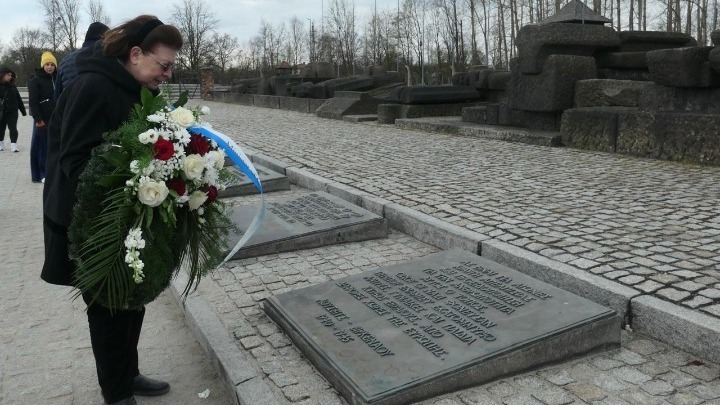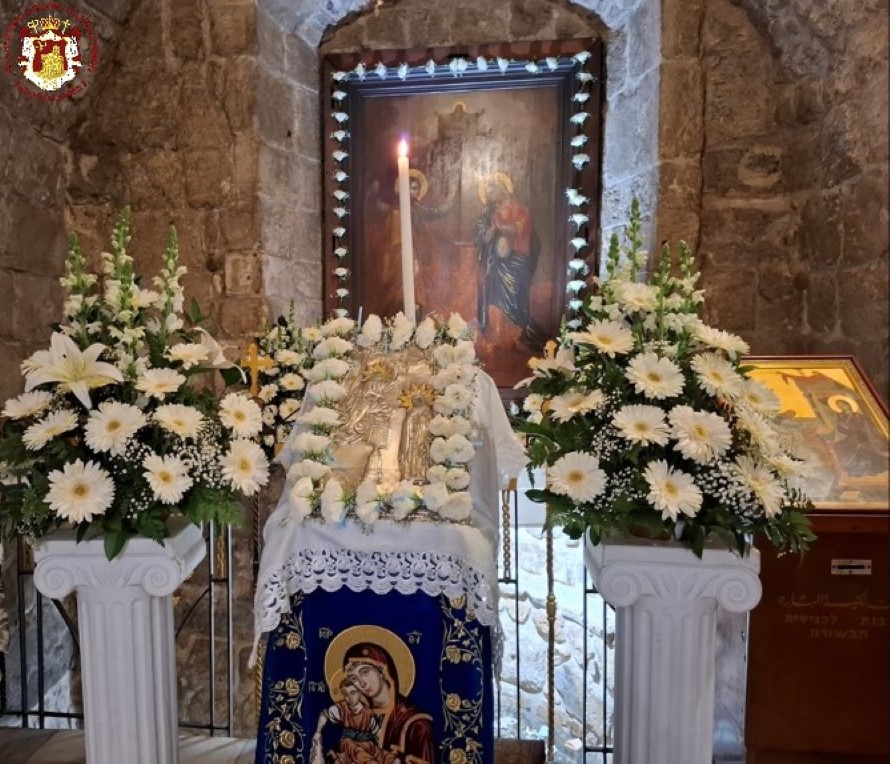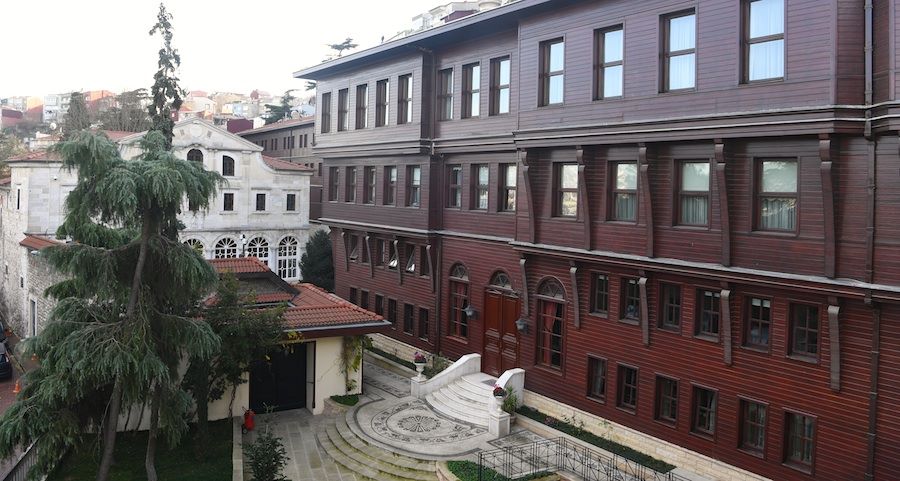Repose of the New-Hieromartyr Kosmas of Aitolia, Equal of the Apostles (24 August)
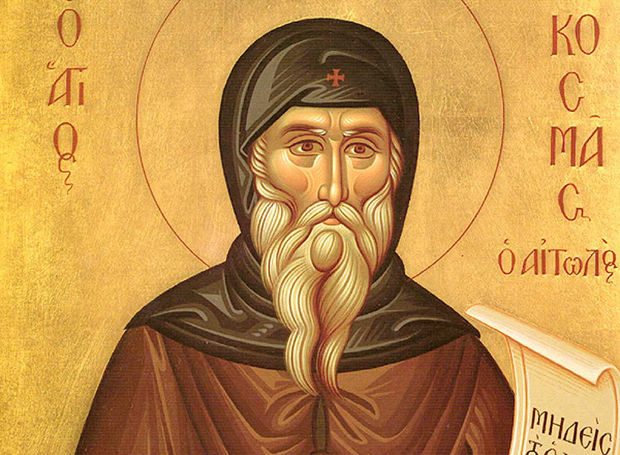
Then he went to Philotheou Monastery. There he became a monk and took the name Kosmas and was ordained a priest. As he says himself: “I went, and on the Holy Mountain I wept for my sins for seventeen years.” From an early age he had great love for God and neighbor. In studying the Gospels he thought by this he could help his brethren in the best manner. He prayed and he consulted with spiritual fathers and elders. He felt that he had to leave his beloved Mount Athos, to help the suffering people. St. Nikodemos continues: “The Nation was in danger of the following: On the one hand the Turks, on the other hand the Enlightenment – the atheistic Enlightenment – of France. The faith was constantly diminishing. Islam was in triumph. The Greek language was disappearing. Whole provinces forgot Romeik [Greek] and some spoke Turkish, others Slavic, others Arvanite and others Vlach. There was also foreign propaganda. Papal missionaries with Lutheran and Calvanist false apostles took advantage of the poverty of the people and infixed their crooked and infected nails into the immaculate and pure flesh of Christ’s Church. The Saint understood the risk. The pessimistic messages had arrived at Mount Athos. He received them. He had to interrupt his asceticism in the Monastery. The Nation, the Church of Christ, awaited him. He had gained much of an education, over-achieved many virtues, was endowed with beyond-theoretical humility, and divine zeal burned in his heart.”
At Philotheou he felt the call from God to undertake this great work “of enlightening and regenerating his Christian brethren. The Greeks had fallen into ignorance in regards to their religion, and this resulted in much wickedness, with large numbers changing their faith from Orthodoxy to Muhammadanism. Kosmas felt this deepest. Therefore he requested and received the permission of his elders to undertake such a mission. Leaving the Holy Mountain, he went to Constantinople, met with Patriarch Seraphim (1757-1761) and received from him written permission to preach throughout Greece.
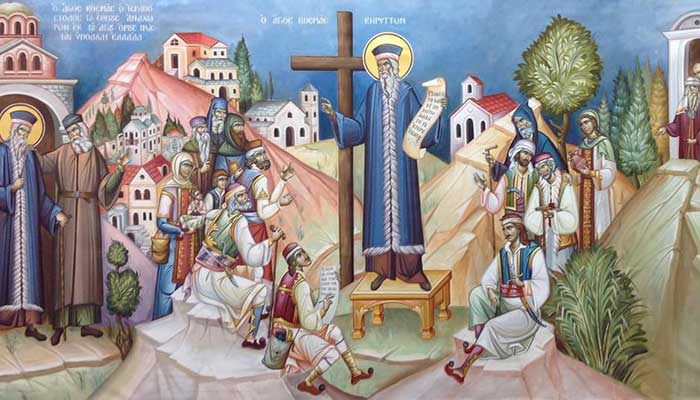
The Jews slandered him to the Turkish authorities, and managed with a lot of money given to Ahmet Kurt Pasha of Berat to achieve his killing. The Saint foreknew his end and on his last night “he showed no signs of sadness for his withdrawal from this life, but he even appeared graceful in his face, as if he was going to joys and revelry.” They hanged him from a tree in the village of Kolikondasi and threw his honorable relic in the Apsos River. Despite the fact that they tied a rock around his neck, his relic washed ashore. It was found by the pious priest Mark and buried in the Monastery of the Theotokos Ardenica. The Saint was martyred on August 24, 1779. In August of 1813 the translation of his honorable relic took place. The following year a church and monastery were built in his honor by command of Ali Pasha of Ioannina, which he had prophesied about.
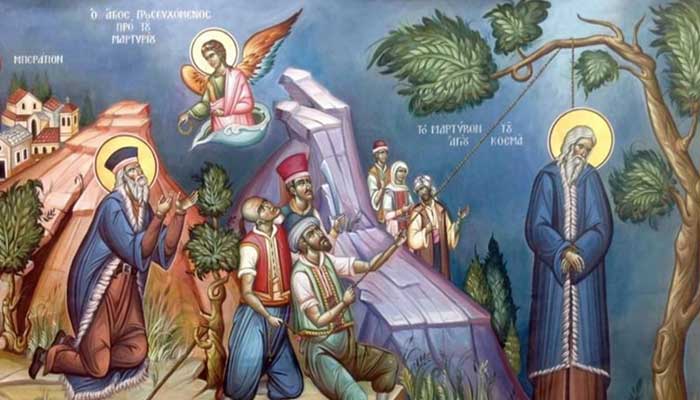
The New Hieromartyr Cosmas, Equal of the Apostles, in the world Constas, was a native of Aitolia. He studied at first under the guidance of the archdeacon Ananias Dervisanos, and afterwards continued his education on Mount Athos, at the Vatopedi school renowned for teachers such as Nicholas Tzartzoulios (from Metsovo) and Eugenius Voulgaris (afterwards in the years 1775-1779 the archbishop of Ekaterinoslav and the Chersonessus).
Remaining on Athos at the Philotheou monastery to devote himself to spiritual labors, he was tonsured a monk with the name Cosmas, and later was ordained hieromonk. The desire to benefit his fellow Christians, to guide them upon the way of salvation and strengthen their faith, impelled Saint Cosmas to seek the blessing of his spiritual fathers and go to Constantinople. There he mastered the art of rhetoric and, having received a written permit of Patriarch Seraphim II (and later from his successor Sophronius) to preach the Holy Gospel.
So the saint began to proclaim the Gospel at first in the churches of Constantinople and the surrounding villages, then in the Danube regions, in Thessalonica, in Verroia, in Macedonia, Chimaera, Akarnania, Aitolia, on the islands of Saint Maura, Kephalonia and other places.
His preaching, filled with the grace of the Holy Spirit, was simple, calm, and gentle. It brought Christians great spiritual benefit. The Lord Himself assisted him and confirmed his words with signs and miracles, just as He had confirmed the preaching of the Apostles.
Preaching in the remote areas of Albania, where Christian piety had almost disappeared among the rough and coarse people entrenched in sin, Saint Cosmas led them to sincere repentance and improvement with the Word of God.
Under his guidance, church schools were opened in the towns and villages. The rich offered their money for the betterment of the churches, for the purchase of Holy Books (which the saint distributed to the literate), veils (which he gave women, admonishing them to come to church with covered heads),for prayer ropes and crosses (which he distributed to the common folk), and for baptismal fonts so that children could be baptized in the proper manner.
Since the churches could not accommodate everyone wanting to hear the wise preacher, Saint Cosmas with forty or fifty priests served the Vigil in the fields, and in city squares, where thousands of people prayed for the living and for the dead, and were edified by his preaching. Everywhere that Saint Cosmas halted and preached, the grateful listeners set up a large wooden cross, which remained thereafter in memory of this.
The apostolic service of Saint Cosmas was brought to a close by his martyric death in the year 1779. At 65 years of age, he was seized by the Turks and strangled. His body was thrown into a river, and after three days, was found by the priest Mark and buried near the village of Kolikontasi at the monastery of the Entrance into the Temple of the Most Holy Theotokos. Afterwards, part of his relics were transferred to various places as a blessing.
He was glorified by the Ecumenical Patriarchate in 1961.
Our holy Father Cosmas was from the town of Mega Dendron (Great Tree) of Aetolia. At the age of twenty, he went to study at the school of the Monastery of Vatopedi on the Holy Mountain. Later, he came to the Athonite Monastery of Philotheou where he was tonsured.
With the blessing of his abbot, he departed for Constantinople where he learned the art of rhetoric, and thereafter, he began to preach throughout all the regions of northern Greece, the Ionian Islands, but especially in Albania, for the Christian people there were in great ignorance because of the oppression and cruelty of the Moslems.
Finally, in 1776, after having greatly strengthened and enlightened the faithful, working many signs and wonders all the while, he was falsely accused by the leaders of the Jewish people and was executed by strangulation by the Moslem Turks in Albania.
Apolytikion of Cosmas of Aitola
Third Tone
With odes let us acclaim the renowned Cosmas, who gloriously excelled among the choirs of the martyrs, priest, and ascetics, and let gather in praise of his memory; for he dispenseth healing to them that have recourse to him with faith, since, as an equal of the Apostles, he hath boldness before Christ.
Source: oca.org / goarch.org


